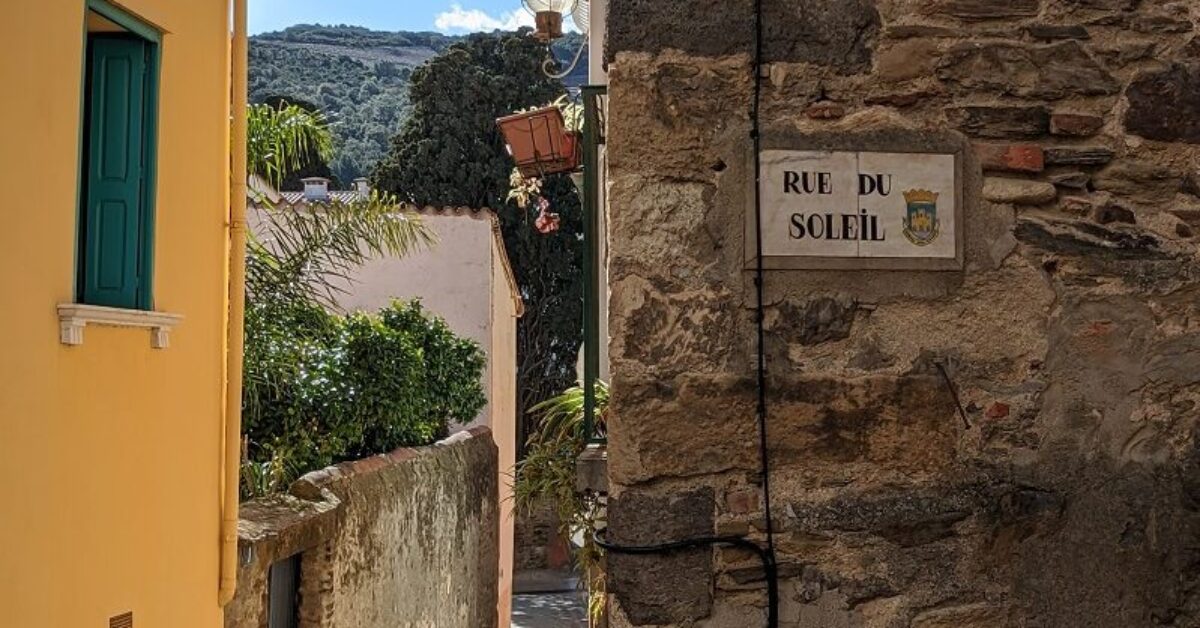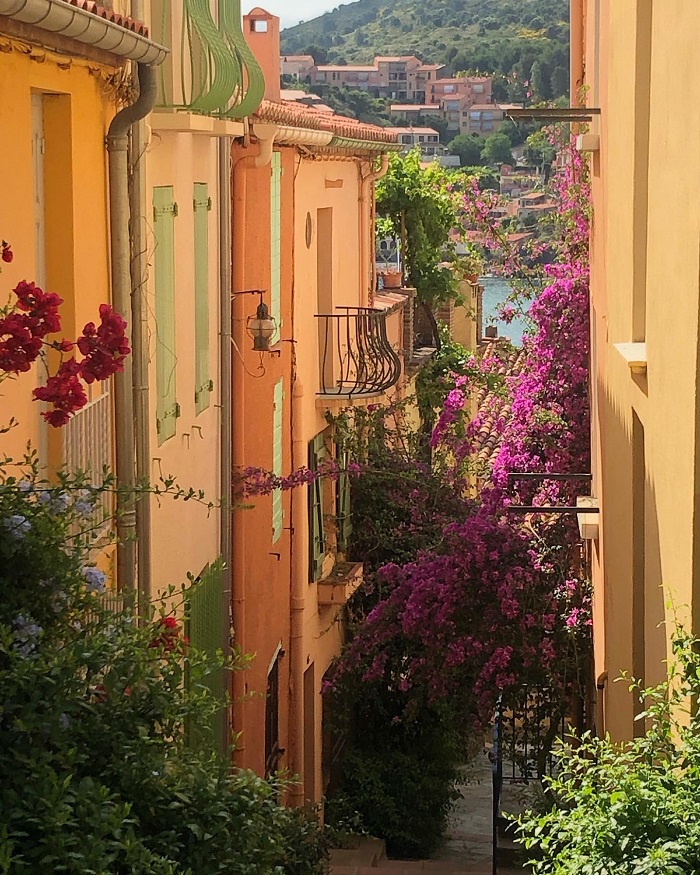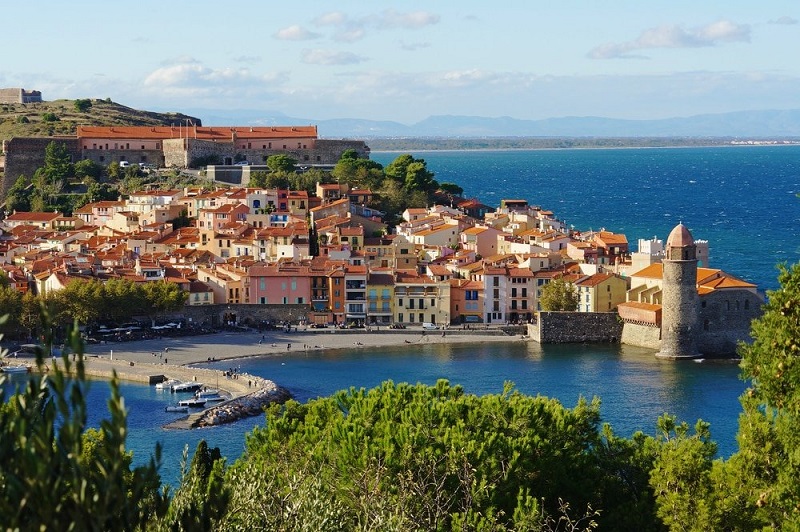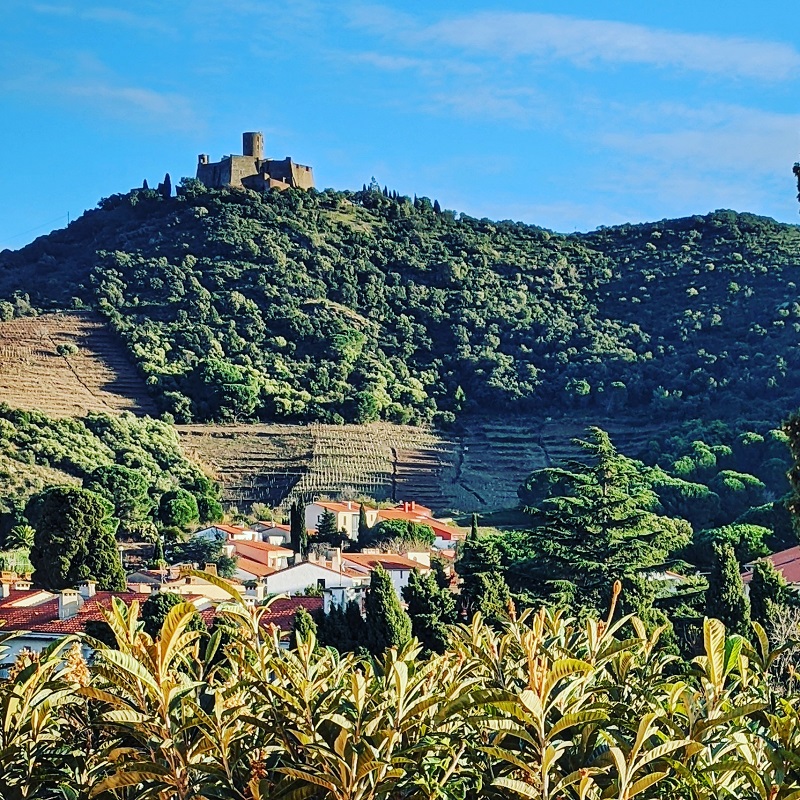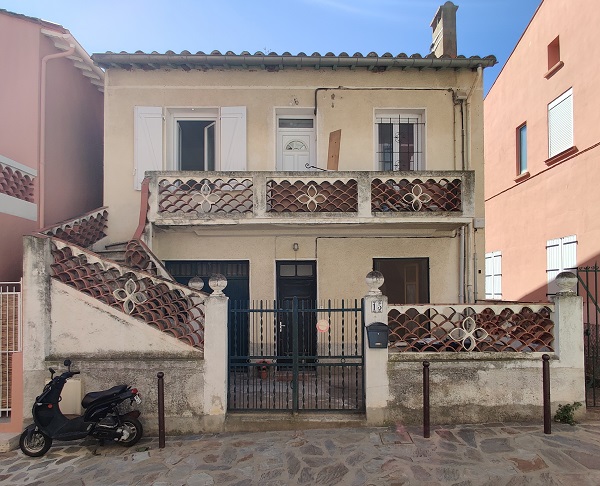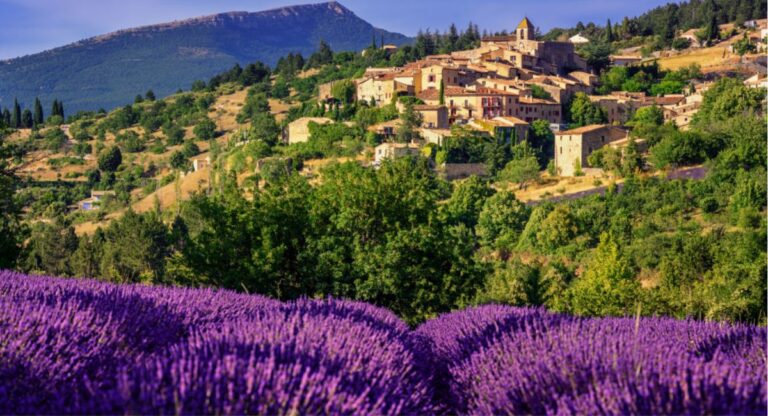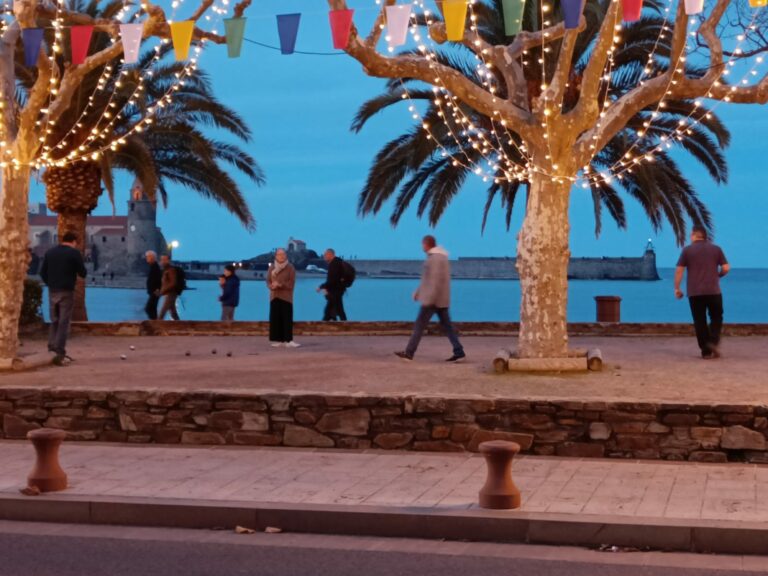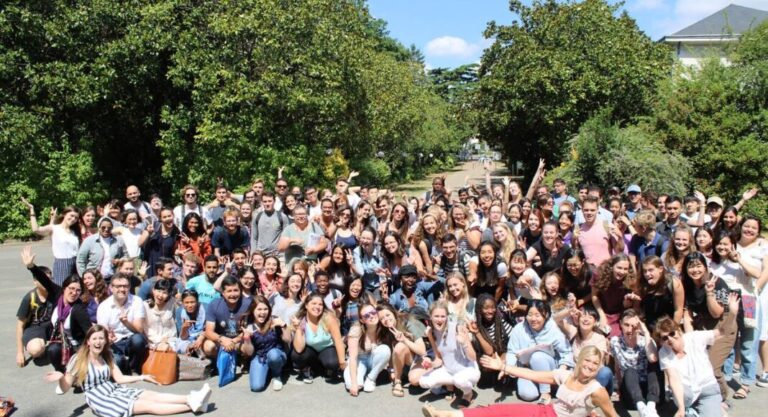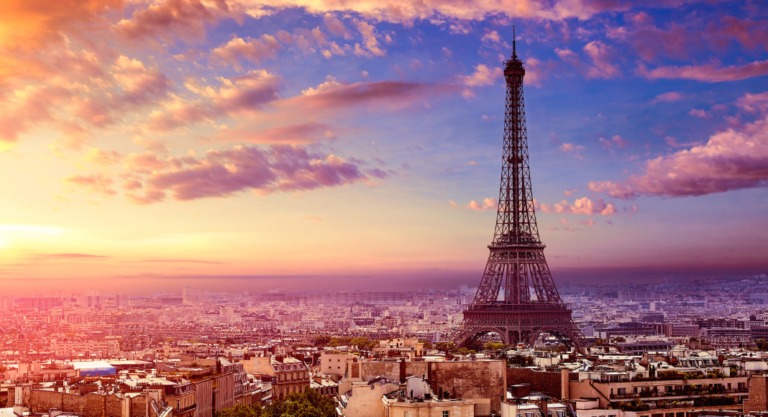My husband and I live in Collioure, a small village in the South of France. The Mediterranean is a block from our house. From our backyard, we have a view of the foothills of the Pyrenees, terraced vineyards and a trio of ancient forts. We moved here in May 2019, and, a year later, in the middle of the pandemic, bought a little house on Rue du Soleil.
I wouldn’t say we are the least likely couple to make this happen, but when we told our friends we were moving to France, the responses ranged from “no way!” to “you’re kidding, right?” Jerrod and I have lived on the West Coast our entire lives. We don’t have much money. We’re not even particularly restless (we lived in the same house for fifteen years in Portland, Oregon.) The English-speaking real estate agent who showed us the little house on the Rue du Soleil suggested we’d experienced a coup de foudre, a thunderbolt. The phrase means love at first sight. It happens a lot in Collioure. People come for a short visit, eat tapas at a beachside café, stroll the cobblestone streets, take a twilight swim, and find themselves enchanted. It happened to Henri Matisse, in the summer of 1905; he arrived feeling washed up at thirty-five, a bored painter of depressing brown and gray landscapes, and departed in the Fall, a “fauve” – a wild beast — unafraid to render the mountains pink, the sea red, the sky green.
Here’s how we got here: In September 2010, a Portland friend rented a big house in Collioure and invited us to stay for a week. I’d been to France a half dozen times, and I wasn’t even sure where Collioure was. (So close to Spain you can go there for lunch.) We returned the next spring and rented a house by ourselves, and then did the same every spring thereafter. Every year we arrived a bit earlier, stayed a bit longer, and felt less inclined to leave. The first year there was no Internet, and every morning we hiked down the hill to the internet café with our laptops. The next year, the house we rented had Wi-Fi. The year after that, the Wi-Fi was faster.
We started to bring work. I answered emails that began “Bonjour! I’m coming to you from FRANCE!” but no one cared where I was coming from. If my husband and I had been massage therapists or marriage counselors, we could not have entertained a move from Portland to a postcard village in the deep south of France. But I’m a writer and he’s a computer network engineer. Those are sit-on-your-ass-in-front-of-a-screen jobs, and we could do them from anywhere. We could do them from Collioure. We could move to Collioure. We returned to Portland, talked about the idea, but did nothing.
Mostly, we spent the long, rainy days of winter in the Pacific Northwest, saying to each other, “we could be in Collioure right now.” We’d spring for a five-buck baguette at Whole Foods, and then be triggered into a passionate reminiscence about the far superior one-euro baguette you could get in Collioure. We’d open a bottle of rosé and say “You know, we could be drinking this in Collioure!” One year, Jerrod had a minor medical procedure that set us back six grand, and we harumphed, “In France, this would be free!”
Then, in June of 2018, my daughter got married. She was twenty-seven, and was already filing her own taxes and getting her teeth cleaned on the regular. She was an adult. But getting married made her seem even more adult-ish. It underscored the reality that I was no longer needed in quite the same way. We joked that if we were ever going to move to Collioure, we needed to do it before grandchildren arrived to throw a lasso around our hearts, as they surely would.
There was something else nagging at me. My mother died when she was forty-six, never having been to Europe, a life-long dream. There was never enough money, or my father couldn’t get the time off work. I was seventeen, and witnessed firsthand her deep regret, her swift decline (she had a malignant brain tumor). I learned from her the hard way that if you wanted to do something, you had to just do it.
The only reason we could come up with not to move to France was the monumental pain in the ass it would be. Especially for people like us, by which I mean disorganized to a nearly pathological degree. You know how in many successful couples one person is a free spirit and the other saves receipts? We DON’T even ask for receipts. In our house in Portland, every drawer was a junk drawer. We could barely get it together to replace a burned-out bulb. Monday morning garbage pick-up always came as a surprise. Jerrod would awaken in the dark, to the sound of the truck rumbling down the street, and a Monty Python-style sketch would ensue where he jumped up, threw on a robe, and raced to get the can down to the street before the truck disappeared around the bend.
Finally, after years of talking about it, and even though a move to France seemed logistically beyond us, we still couldn’t come up with any legitimate or even existential reasons not to go. We’d miss our friends and family – of course we would! — but our friends and family could come visit. We discovered Norwegian Air, the low-fare international carrier and their cheapo fares from Europe to LA. Going back to the US to visit would practically be as easy as hopping on a bus. (All this was pre-pandemic pie-in-the-sky planning.)
In early 2019 we applied for our long stay visas.
You’ve probably heard about the nightmare of assembling the correct paperwork. I really leaned into it, and put together our dossiers, fat with photocopies in triplicate of every important piece of paper in our entire lives. Except our marriage license. I didn’t include the marriage license because we didn’t have a marriage license. We’d been living together for twenty years (I’d been married before and didn’t want to get married again). Then, Jerrod suggested coyly that maybe it would be easier to move to France if we were married, than to try to figure out the bureaucracy, and associated mountain of paperwork, surrounding obtaining a Pacte Civil de Solidarité, a domestic partnership.
Dear Reader, I said yes.
I also said I wanted to go to Vegas, to be married by Elvis at the Graceland Chapel Wedding.
Giddy with the idea of eloping, we sprung for the $199 Viva Las Vegas wedding package, which included a bouquet, rose boutonniere, copy of Elvis and Priscilla’s wedding certificate, and ceremony performed by Elvis, who would also give me away, and sing two songs. The first available date was April 20. In early March, we submitted our dossier to the visa processing center, without the marriage certificate, but with the box checked saying we were married. We weren’t married at that moment, of course, but by the time we moved to France, we would be. As Americans, we don’t sweat the small stuff of details.
The French embassy in Washington D.C. disagreed. A week later I received an official email asking for the marriage certificate. Failure to submit it within five days would result in an immediate refusal. I raced downstairs with my laptop and showed Jerrod the email, and we determined, with uncharacteristic urgency, that we needed to get married that day. We drove downtown to the courthouse, applied for the marriage license, and while driving home called our neighbor, Patty, a Unitarian minister, and asked if she could marry us in our backyard in forty-five minutes. She had always been a fan of us as a couple, and there was no time like the present. Her girlfriend, and another neighbor, whom we nabbed when he was out trimming a hedge, served as witnesses. I submitted the marriage certificate that afternoon, and we received our visas a week later.
On the day they arrived, we noticed something that had apparently escaped our notice before: we only had three months to get ourselves to France before the visas expired. Jerrod and I may be disorganized and lazy, but we were self-employed, and knew how to embrace the power of a deadline. We kicked it into high gear. We Marie Kondo’ed the crap out of our crap, took carloads to the Goodwill, gave it away on Freecycle. We gave away our car, met with a realtor, listed the house in Portland, and on May 15 boarded a Delta flight with five roller suitcases. Throughout all of this, we were too exhausted to argue.
If Rue du Soleil is the most beautiful street in Collioure, our house is the ugliest one on it. It’s a two-story stucco box with a small concrete courtyard, built in 1947. The house doesn’t sit square on the lot. Each floor was built as a separate unit, connected by a massive exterior staircase with stone steps and an ornate brick baluster. On the second floor (known as the first floor in France) there were crumbling terraces. The front of the house had been painted, but the sides and the back were bare stucco.
But in the same way we fell in love with Collioure, we fell in love with this little house. The literal translation of Rue du Soleil is “Sunshine Street,” and we chose to view this was a good omen. We would gut the whole thing, unite the two floors with an interior staircase. Our bedroom would run along the south-facing back of the second floor (first floor), our bed positioned in front of the French doors that opened out onto the back crumbling terrace, and a breathtaking view of the vineyards, mountains, and trio of ancient forts. We, who had never painted a room or rearranged the furniture in our Portland house if we could help it, decided were going to undertake a down-to-the-studs remodel in a foreign country, in a foreign language.
What could go wrong?
Karen Karbo is a frequent contributor to Frenchly. Her 2021 essay, Au Revoir Thanksgiving was the germ for this column. Karen is the author of fourteen award-winning novels and works of non-fiction including the international bestseller, The Gospel According to Coco Chanel. Her essays, articles and reviews have appeared in Elle, Vogue, O., The New York Times, Tin House, Salon, Slate and elsewhere. To connect with her, buy her books, and learn about her writer’s retreat in Collioure, please visit her website here.
Photo credits, top to bottom: All photos were taken by the author, Karen Karbo, and are as follows:”Summer Street Scene Centre Ville,” “Aerial View of the Centre Ville,” “The View of Fort St. Elme and Vineyards from our Bathroom Window,” and “Our House.”
The painting is by Henri Matisse and is called, Rue du Soleil à Collioure, 1905, oil on canvas.

